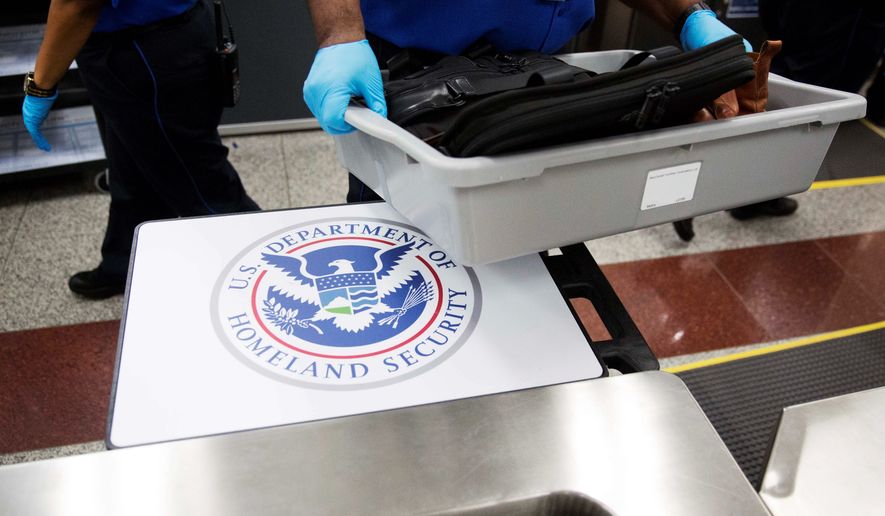A confidential Transportation Security Administration report says the number of “artfully concealed” prohibited items increased at airports in June, creating fears about threats to passenger aircraft.
Meanwhile, a U.S. railroad association issued a separate alert Monday to workers in light of the Islamic State’s mass of social media posts, such as its magazine Dabiq, urging followers to kill. A year ago this month, two U.S. service members stopped a heavily armed jihadi from gunning down passengers on a high-speed Amsterdam-to-Paris train. Authorities said the National Guardsman and Air Force airman likely prevented a railway massacre.
The report by TSA’s office of intelligence and analysis said the bulk of June incidents were at aviation hubs and included discoveries of weapons, ammunition and a hatchet hidden in luggage.
“The examples highlighted in this report are noteworthy for the behavior, size or unique tactic of concealment involved,” said the “official use only” report. “Weapon, ammunition, and drug smuggling in an artfully concealed manner continued during this reporting period. Some discoveries of interest this month involved drugs concealed in luggage and clothing, ammunition and a hatchet concealed in luggage, and one incident of possible insider access involving smuggling.”
The report does not mention the word “terrorism” or the Islamic State, the global terrorist network that is working to sabotage passenger aircraft with undetectable explosives. But it does say the concealment tactics could be used for “nefarious purposes.”
The Islamic State (also known as ISIS, ISIL and Daesh) claimed responsibility for bringing down a Russian jet over Egypt’s Sinai Peninsula in November, killing all 224 people on board. The group later displayed a photo of what it said was the type of bomb used: explosives inside a soda can.
A government official provided the TSA report to The Washington Times to highlight what the source believes are continued threats to aircraft.
The TSA report says: “While this month’s incidents appear to be criminal in nature, all of the tactics could be used to smuggle items for more nefarious purposes. Security personnel should continue to maintain vigilance for threats to transportation security and should all continue to report suspected criminal activity to law enforcement officers as appropriate.”
The increase in incidents rose from 10 in May to 13 in June, which is down from peak numbers in 2013.
Robert Maginnis, a retired Army officer and counterterrorism specialist, said the Islamic State undoubtedly is looking at ways to bring down planes. The FBI has said it is monitoring hundreds of the group’s followers in the United States.
“Some of those ’agents’ inevitably have special skills useful for bringing down airliners by explosives planted aboard aircraft and/or by creating mechanical problems that emerge at altitude,” Mr. Maginnis said. “I would expect ISIS agents have gone to school on al Qaeda in the Arabian Peninsula’s bomb maker, Ibrahim Hassan Tali al-Asiri, who inserted a bomb in his brother’s rectum but failed to kill Saudi Prince bin Nayef, the plot’s target.”
Based in Yemen, al Qaeda in the Arabian Peninsula specializes in bomb development and is committed to attacking the U.S. homeland.
“Expect ISIS agents to use the latest technology to include small armed drones, chemical agents made from inert substances, and biological toxins to create catastrophic situations for aircraft whether in flight or on the ground,” said Mr. Maginnis, author of the book “Never Submit: Will the Extermination of Christians Get Worse Before It Gets Better.”
The TSA report highlighted a few of June’s 13 incidents. Among them:
• A checked bag at Fort Lauderdale-Hollywood International Airport contained 150 rounds of 9 mm ammunition inside what was described as a “power supply.” Also in the luggage were .40 caliber ammunition, a rifle scope, a pistol barrel and ballistic springs.
• A passenger at Tampa International Airport carried a bag that concealed a hatchet. “The hatchet was concealed inside the collapsible handle compartment of the bag,” the TSA said.
The TSA report did not include “artfully concealed” incidents from previous months or explain why a passenger was trying to take a hatchet onboard an airplane.
The Association of American Railroads issued a situational awareness message over its Railway Alert Network. It urged railroad workers to be on extra-alert status in response to the Islamic State’s latest edition of its online Dabiq magazine.
The Islamic State has targeted mass-transit systems.
The Railway Alert Network report summarizes the Islamic State articles that romanticize deadly attacks in Magnanville and Nice, both in France; Orlando, Florida; and elsewhere.
“ISIL uses a publication like Dabiq for two primary purposes,” the railroad association writes. “To define priorities and themes for supporters to echo in postings through social media and other internet channels; and to incite preparation for and execution of attacks against listed targets.
“Meriting continuing reinforcement with railroad employees is the importance of their attentiveness to their surroundings, both at work and in their neighborhoods and communities, for these types of indicators,” the Railway Alert Network states.
• Rowan Scarborough can be reached at rscarborough@washingtontimes.com.




Please read our comment policy before commenting.